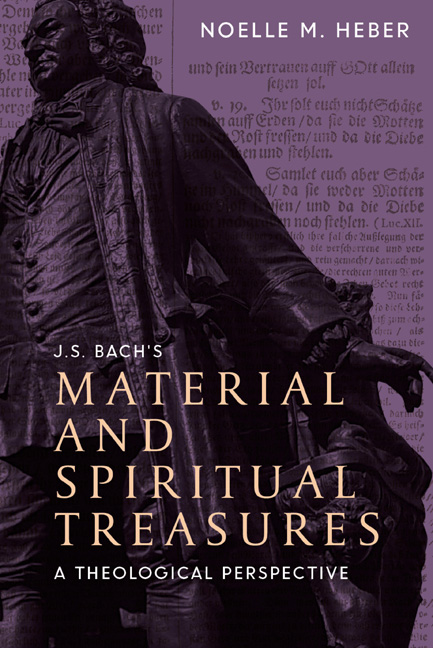Book contents
- Frontmatter
- Dedication
- Contents
- List of Illustrations
- List of Music Examples
- Foreword
- Preface
- List of Abbreviations
- Introduction
- 1 Bach’s Material Treasures: Career, Salary, and Freelancing
- 2 The Servant Prince: Poverty of Christ: Three Days of Christmas (BWV 91, 197a, 248/I, 121, 151)
- 3 Mammon’s Chain: The Destructive and Redemptive Potentials of Material Wealth: Ninth Sunday after Trinity (BWV 105, 94, 168)
- 4 The Afflicted Shall Eat: Tables Are Turned in Eternity: First Sunday after Trinity (BWV 75, 20, 39)
- 5 Spiritual Manna: The Lord Embraces the Poor: Seventh Sunday after Trinity (BWV 186, 187)
- 6 ‘Blood Money’: The Coins that Bought Jesus’ Death: Good Friday (St Matthew Passion)
- 7 Bach’s Spiritual Treasures: Values and Priorities
- Bibliography
- Index of Biblical References
- General Index
Foreword
Published online by Cambridge University Press: 27 March 2021
- Frontmatter
- Dedication
- Contents
- List of Illustrations
- List of Music Examples
- Foreword
- Preface
- List of Abbreviations
- Introduction
- 1 Bach’s Material Treasures: Career, Salary, and Freelancing
- 2 The Servant Prince: Poverty of Christ: Three Days of Christmas (BWV 91, 197a, 248/I, 121, 151)
- 3 Mammon’s Chain: The Destructive and Redemptive Potentials of Material Wealth: Ninth Sunday after Trinity (BWV 105, 94, 168)
- 4 The Afflicted Shall Eat: Tables Are Turned in Eternity: First Sunday after Trinity (BWV 75, 20, 39)
- 5 Spiritual Manna: The Lord Embraces the Poor: Seventh Sunday after Trinity (BWV 186, 187)
- 6 ‘Blood Money’: The Coins that Bought Jesus’ Death: Good Friday (St Matthew Passion)
- 7 Bach’s Spiritual Treasures: Values and Priorities
- Bibliography
- Index of Biblical References
- General Index
Summary
BEFORE the troubled times of the Covid-19 pandemic which became a worldwide crisis early in 2020, my music-history students would typically find remote and quaint, and even a bit humorous, such sentiments as are expressed in Bach's Cantata 102:
Heut lebst du, heut bekehre dich!
Eh morgen kommt, kanns ändern sich;
Wer heut ist frisch, gesund und rot,
Ist morgen krank, ja wohl gar tot.
Today, you are living; convert [to Godliness], today!
Before tomorrow comes, things can change;
One who today is vigorous, healthy, and ruddy,
Is tomorrow sick – sure enough, quite dead.
At present, however, the concerns of Bach's day are seeming rather less foreign.
In Bach's world, blood infection was a continual threat, and a mere scratch on the knee could easily in no time leave you ‘quite dead’; and disease was rampant. Today we have antibiotics, but for how long will they still work? And we have vaccines for many diseases, but will we have one anytime soon for this terrifying Covid-19? In Bach's world, even the welloff could not really afford to be cavalier about food and money. Today, the same has rapidly become true again for even the well-off.
By the same token, in Bach's world, the arts seem to have been valued more for spiritual comfort and enjoyment than for entertainment, amusement, or ‘pure’ aesthetic contemplation. His contemporaries certainly will rarely, if ever, have appreciated art as something that was in any way worthier than material necessities like food and shelter. The wording of Sirach 41.11 in their Luther Bibles nicely and forcefully summed matters up: Deine Auge sihet gern, was lieblich und schön ist; aber eine grüne Saat lieber denn die beide (‘Your eye likes to see what is lovely and beautiful, but a green crop more than the both of them’). Today, especially during this pandemic, people are increasingly realizing that art for art's sake – with its advocating a near total separation from the material concerns of life – is a romantic notion whose sell-by date has long passed.
J. S. Bach's Material and Spiritual Treasures, then, is an extraordinarily welcome and timely book for scholars and other enthusiasts who seek in their appreciation of Bach to be better informed about the concrete historical realities of early eighteenth-century life and music.
- Type
- Chapter
- Information
- J. S. Bach's Material and Spiritual TreasuresA Theological Perspective, pp. xiii - xivPublisher: Boydell & BrewerPrint publication year: 2021



